Doctoral Programs in Social Work













Welcome to the Brown School at Washington University in St. Louis. We prepare leaders in social work, public health and social policy — complementary professions aimed at supporting healthy and productive individuals, families, communities and systems.

Our collaborative and entrepreneurial community is dedicated to equity and committed to impact. We equip our students to think critically as social work and public health scientists, to succeed as independent investigators and to understand and address challenges for the nation and world. The excellence and support of our faculty, the diversity and dedication of our students, and the unique opportunities available through our School and Washington University create an unparalleled academic environment.
We hope you will learn more and join us.
Sincerely, Tonya Edmond and Rodrigo Reis Interim Co-Deans

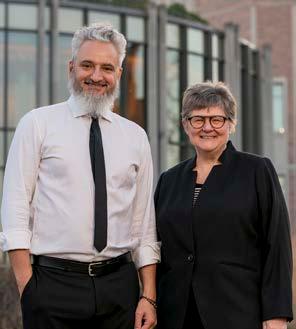
Director, Social Work PhD Program, Director, NIMH T-32 Brown School Training Program in Mental Health Services Research, Co-Director, Center for Mental Health Services Research
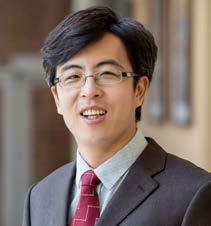
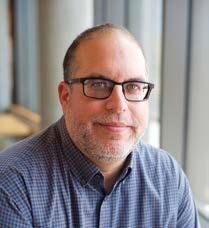
“For more than half a century, our doctoral program has established itself as a leader in preparing the next generation of social work scholars for impactful careers dedicated to social justice, equity, and rigorous research. Our students receive individualized mentoring and training by a multidisciplinary faculty dedicated and passionate to preparing the profession’s best social work scholars, teachers, and researchers to address the world’s biggest challenges.”

Associate Professor, Director, Doctoral Education in Public Health Sciences
“The public health sciences doctoral program provides unique training and research opportunities for transdisciplinary problem solving. Doctoral students team with faculty to address complex public health issues locally, nationally, and globally. Training offers distinct hands-on experience with innovative science that promotes health, confronts disparities, and informs policies.”
Associate Professor, Faculty Lead, Public Health
“Brown School is the home for so many talented, passionate souls. Trained as a policy analyst, epidemiologist, and quantitative modeling practitioner, I enjoyed every minute of working with my students in solving real-world problems. Together, we hope to promote positive social change and make the community we serve a better place.”
Sheretta Butler Barnes , PhD
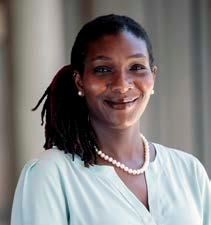
Associate Professor, Faculty Lead, Social Work
“The Brown School creates changemakers. To do this, we prepare our students to address the racial and social injustices that plague our communities. Our transdisciplinary approach prepares students to address these complex issues through research in policy, social work, and public health.”

 DONNY GERKE,
DONNY GERKE,
We are part of Washington University, one of the nation’s preeminent research universities.
Our top-ranked school of social work, groundbreaking program in public health, renowned medical school and Institute for Public Health provide doctoral students extraordinary opportunities for scholarship and integrated learning. The School’s transdisciplinary programs will allow you to explore your field in innovative ways and create new depths of understanding.
The Brown School is dedicated to providing our doctoral students:
Personalized and hands-on research experiences and mentoring by leading scholars
A transdisciplinary curriculum that builds methodological and analytical skills
Deep knowledge of their field’s theoretical and conceptual underpinnings, philosophy and history
Teaching practica focused on functional content and pedagogy to prepare for independent teaching at the graduate level
Professional growth, network building and successful placement throughout the world
Flexibility in choosing a traditional dissertation format or a three-paper format
Full-tuition scholarships, four-year stipends, subsidized health insurance and professional development accounts
The Brown School boasts top scholars and experts in their fields, committed to generating new knowledge and bringing that knowledge into both the classroom and the community. You and your work will receive the benefit of their mentorship and guidance.
Examples of faculty areas of expertise include:
Asset and savings building
Complex systems and systems science
Data science
Dissemination and implementation science
Epidemiology and biostatistics
Evidence-based interventions and policies
Family and child welfare
Global health and social work
Health economics and health insurance
Health disparities and social determinants of health
Health promotion and disease prevention
Housing and homelessness
Mental health and addictions
Physical activity
Productive aging
Reproductive and sexual health
Social and health policy
Qualitative and participatory research methods
Social and economic development
Social work in international settings
Urban design and the built environment
Violence and injury prevention Youth development
“My time at the Brown School has been such a transformational experience. From the very beginning of the program I was supported and encouraged by brilliant faculty, embraced by the local St. Louis American Indian community, and continually uplifted by the Buder Center. The impact of being surrounded by fellow Native scholars and faculty all while maintaining our connections to our cultures cannot be overstated. Nea'ese (thank you) for supporting my educational journey.”
AUTUMN ASHER BLACKDEER, PHD CANDIDATE IN SOCIAL WORK (pictured left, with the late Associate Professor David Patterson Silver Wolf)

During your first year, one of the doctoral program directors will serve as your primary faculty advisor. By your second year, you will identify a substantive faculty advisor who will then serve as your primary advisor for the remainder of your program. In your second year and following, additional faculty will serve as teaching and research mentors, as well as dissertation committee members.
To learn more about our renowned faculty, visit brownschool.wustl.edu/faculty
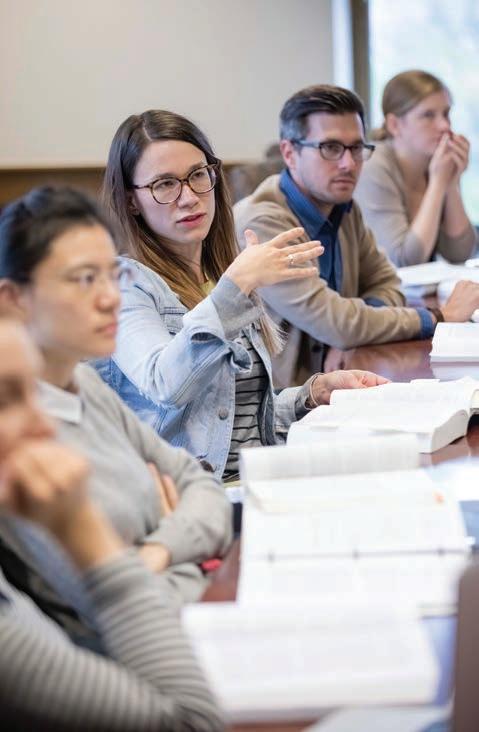
The most vital and groundbreaking social work and public health research is being conducted at the Brown School and its numerous faculty-led research centers and institutes. You’ll have access to, and engagement with, the data, policies and strategies that are forging the future of these fields.
Centers include:
Centene Center for Health Transformation Center for Community Health Partnership And Research Center for Diabetes Translation Research Center for Dissemination and Implementation Center for Health Economics and Policy Center for Innovation in Child Maltreatment Policy, Research and Training
Center for Mental Health Services Research
Center for Obesity Prevention and Policy Research
Center for Public Health Systems Science Center for Social Development
Center for Violence and Injury Prevention Clark-Fox Policy Institute
Evaluation Center Health Communication Research Laboratory Implementation Research Institute Institute for Public Health Institute of Clinical and Transformational Sciences International Center for Child Health and Development
Kathryn M. Buder Center for American Indian Studies
Prevention Research Center in St. Louis
SMART Africa Center
Social Policy Institute Social System Design Lab
Learn more about our research depth at brownschool.wustl.edu/research
The Brown School currently supports two T32 training programs funded by the National Institutes of Health for PhD students enrolled in our social work program, and for scholars already holding doctorates in social work and related disciplines, who are interested in addictions and mental health research.
Transdisciplinary Training in Addictions Research (TranSTAR) T32 Program
Brown School's NIMH T32 Program in Mental Health Services Research
Both programs provide tuition fellowships and stipends, specialized coursework and mentored research training for eligible applicants.
Our trainees have been very successful in pursuing research funding through NIH and other competitive funding sources, and our alumni hold faculty positions at some of the nation’s top research institutions.
Find out more about these opportunities at brownschool.wustl.edu/PhDtraining
“As a Mental Health Services Research fellow, I was able to hone my grant writing and analytical skills. Additionally, the Race and Opportunity Lab within the Center for Social Development contributed to my growth in leadership and enabled me to gain a deeper understanding of research methodology for the study of Black emerging adults.”
ROBERT MOTLEY JR., PHD '21 Assistant Professor, Boston College School of Social Work
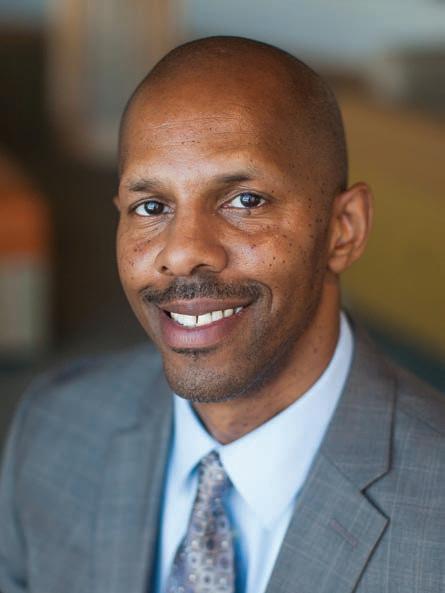
The curriculum at the Brown School emphasizes significant theoretical and methodological preparation.
Candidates for doctoral degrees must have and/or complete the following to graduate:
Previously obtained master’s degree
72 graduate credit hours for the Public Health Sciences program, which can include 21 master’s-level credits transferred from a relevant degree
74 graduate credit hours for the Social Work program, which can include 21 master’s-level credits transferred from a relevant degree
Two years of full-time coursework
An additional two to three years for dissertation completion
Three teaching practica for course credit
Three research practica for course credit
Completion of an area of specialization statement, qualifying examination and oral dissertation defense
The first year of study includes basic principles in research, statistics and measurement, as well as theoretical orientations and content fortifying the knowledge base of social work or public health. After the first semester, each student begins a more individualized program of study. A curriculum plan is developed in consultation with the faculty advisor to develop the substantive and methodological skills to support the student’s area of focus.
“When I was looking into schools for my PhD, I knew I wanted a program that was grounded in robust quantitative and analytical methods. I chose the Brown School because it was clear that the faculty and leadership here feel the same way. Every semester, I’ve taken at least one quantitative methods course that has helped me to extract the most value from my research as well as my theory and substantive area courses.”
K ARISHMA FURTADO, PHD '20
Founding Staff, Director of Data and Research at Forward Through Ferguson
After the foundation semester, students customize their program from a wide array of courses available at the Brown School and across the university campus.
Agent-Based Modeling
Epidemiology of Psychiatric Disorders Across the Lifespan
Foundations of Geographic Information Systems (GIS) for the Applied Sciences
Generalized Linear Modeling
Global Burden of Disease: Methods and Applications Issues and Directions in Intervention Research
Multilevel and Longitudinal Modeling Operations Management Politics of Education
Propensity Score Analysis Psychology of Aging
Qualitative and Participatory Research Methods
Social Network Analysis
Structural Equation Modeling
Survival Analysis System Dynamics
Transdisciplinary Problem Solving: Child Maltreatment Prevention
Other Brown School graduate courses in substantive and methods areas taught by faculty experts
Allen, P. C., Butler-Barnes, S. T., Robinson, H., & Jackson, A. (2022). Simply Put, I’m Tired: Efficacy to Combat Racism among African American Adolescent Boys and Girls. Journal of Child and Family Studies, 31(2), 365-376.
Asher BlackDeer, A., Patterson Silver Wolf, D. A., Maguin, E., & Beeler-Stinn, S. (2021). Depression and anxiety among college students: Understanding the impact on grade average and differences in gender and ethnicity. Journal of American college health, 1-12.
Cohen, F. (2022) Cultural idioms of distress among crisis-affected individuals: a scoping review. International Journal of Social Psychiatry. https:// doi.org/10.1177/00207640221114742
Foell, A., Pitzer, K. A., Nebbitt, V., Lombe, M., Yu, M., Villodas, M. L., & Newransky, C. (2021). Exposure to community violence and depressive symptoms: Examining community, family, and peer effects among public housing youth. Health & place, 69, 102579.
Li, Y., Fabbre, V. D., & Gaveras, E. (2022). Authenticated social capital: conceptualising power, resistance and well-being in the lives of transgender older adults. Culture, Health & Sexuality, 1-16.
McLay, M. M. (2022). When “shelter-in-place” isn’t shelter that’s safe: A rapid analysis of domestic violence case differences during the COVID-19 pandemic and stay-at-home orders. Journal of family violence, 37(6), 861-870.
Evers, E. C., Waters, W. F., Gallegos-Riofrío, C. A., Lutter, C. K., Stewart, C. P., & Iannotti, L. L. (2022). A sex-and gender-based analysis of factors associated with linear growth in infants in Ecuadorian Andes. Scientific reports, 12(1), 1-10.
Garg , R., Croston, M.A., Thompson, T., McQueen, A., Kreuter, M.W. (2022). Correlates of smoking discarded cigarettes in a sample of low-income smokers. Addictive Behaviors. 128, 107237. doi:10.1016/j.addbeh.2022.107237
Gilbert, A., Beck, A., Serrano, N., & Brownson, R. C. (2022). Objective Measures of Physical Activity in Rural Communities: Factors Associated With a Valid Wear and Lessons Learned. Journal of Physical Activity and Health, 19(4), 267-274.
McGuire, F.H., Carl, A., Woodcock, L., Frey, L., Dake, E., Matthews, D.D., Russell, K., & Adkins, D. (2021). Differences in patient and parent reports of depression and anxiety symptoms in a clinical sample of transgender and gender diverse youth. LGBT Health, 8(6), 404-411. https://doi.org/10.1089/ lgbt.2020.0478
Malone, S., Prewitt, K., Hackett, R., Lin, J. C., McKay, V., Walsh-Bailey, C., Luke, D. A. (2021). The Clinical Sustainability Assessment Tool: Measuring organizational capacity to promote sustainability in healthcare. Implementation Science Communications. 2, 77. https://doi.org/10.1186/ s43058-021-00181-2
Vahedi, L., Qushua, N., Seff, I., Doering, M., Stoll, C., Bartels, S. A., & Stark, L. (2022). Methodological and ethical implications of using remote data collection tools to measure sexual and reproductive health and genderbased violence outcomes among women and girls in humanitarian and fragile settings: a mixed methods systematic review of peerreviewed research. Trauma, Violence, & Abuse, 15248380221097439.
Our students receive significant accolades for their work, and our graduates enter exciting postdoctoral, research leadership and tenure track positions around the globe.
APHA 1038 Student Oral Session Award for Public Health Education and Health
AACR-Bristol-Myers Squibb Scholar-inTraining Award, American Association for Cancer Research
Centers for Disease Control and Prevention: Morbidity and Mortality Weekly Report
Council on Social Work Education: Child Welfare Track Dissertation Award Doris Duke Fellowship for the Promotion of Child Well-Being
EPIC Scholarship
FOCUS-19 Project
Inter-university Consortium for Political and Social Research Summer Diversity Scholarship
Knight Alzheimer's Disease Research Center (ADRC) NIA T32 Fellowship
National Association of Social Work: William E. Gordon Research Fellowship
National Birth Equity Collaborative: Birth Equity Research Scholar
Open Society Foundation Civil Society Scholar Award
R36 Award: National Institute on Aging
Research Resilience Training Fellow
Social Work HEALS Fellowship
Examples of positions accepted by our graduates in the past two years:
Postdoctoral positions: Research Training Program in Aging at Duke University; Division of Public Health Sciences, Washington University School of Medicine
Research leadership: Data and Research Catalyst at Forward Through Ferguson; Health Science Administrator with the Indian Health Service; Research Scientist with Missouri Institute of Mental Health; Senior Associate at the Iris Group, Analysis Group, Forward Through Ferguson, Indian Health Service, Missouri Institute of Mental Health, Iris Group
Tenure track positions: Boston College, Brigham Young University, University of Hong Kong, Louisiana State University, Maryville University, North Carolina Central University, Rutgers University, SUNY Upstate Medical University, University of Denver, University of Georgia, University of Iowa, University of Illinois at Urbana-Champaign, University of Nevada-Las Vegas
Meet all PhD students and candidates at brownschool.wustl.edu/PhDstudents
The Brown School and its affiliated research centers fill three interconnected buildings in the heart of Washington University, creating a comprehensive “campus within a campus” where you’ll attend classes, connect with faculty members, study and explore.
Our facilities are designed to provide what you need to make the most of your days at the Brown School — including a café, study rooms, library and computer lab, and even lockers and showers for active commuters. Our tight-knit community provides easy access to the many trainings and one-on-one services offered by the Brown School. We frequently offer guest speakers, conferences, panel discussions and professional development trainings — valuable opportunities to connect with and learn from leaders in social work, public health and social policy.
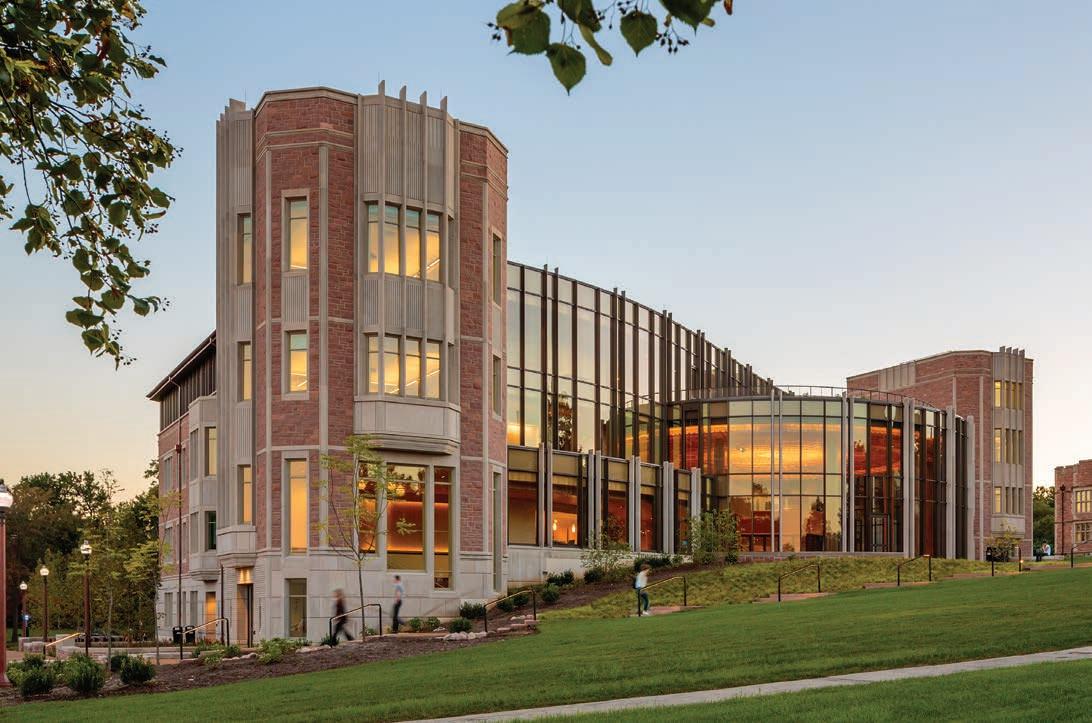
“I have appreciated the countless number of opportunities to connect with students, staff, and faculty at the Brown School; the community is approachable and supportive! During my first year of doctoral studies, through engaging with faculty and staff, I became connected with the Social Policy Institute. I joined the food security research team, where I am currently involved in multidisciplinary projects. Joining the SPI is one of the best decisions I’ve made in my journey!”
TYLER FRANK , PHD STUDENT IN PUBLIC HEALTH SCIENCES
“My time at the Brown School was filled with stimulating coursework, relevant research opportunities, and invaluable mentorship. The Prevention Research Center created a fostering environment that led to my intellectual development, and overall growth in becoming an independent researcher in chronic disease prevention for disadvantaged communities.”
Postdoctoral Fellow, University of Illinois Chicago

“My family moved to St. Louis from New York City and felt like we had landed in a paradise. We developed a wonderful connection with our neighbors, my wife volunteered in our local school district, our daughters loved their schools and we had a supportive faith community. The low cost of living and cultural opportunities were incredibly helpful. No place is perfect, and St. Louis has room to grow, but it was wonderful taking baby steps toward an even better St. Louis with our community.”


 COLE HOOLEY, PHD IN SOCIAL WORK ’19 Assistant Professor, Brigham Young University
COLE HOOLEY, PHD IN SOCIAL WORK ’19 Assistant Professor, Brigham Young University
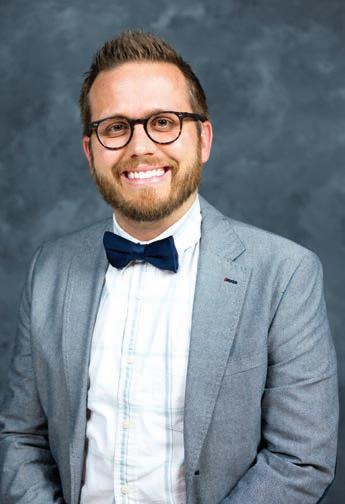

St. Louis offers big-city opportunities and a low cost of living, making it an accessible and desirable destination for students.
Our students live throughout the region and the city’s 79 distinct neighborhoods. They love WashU’s convenient location, served by several bus routes, bike paths and light rail public transit.
The award-winning expanse of Forest Park is just across the street from campus. It encompasses 1,300 acres of green space for you to explore by bike, on foot or via pedal boat or paddleboard — and it’s home to many of the city’s free, world-class museums and events.

Outside of school, our students are active citizens in St. Louis, whether through leadership on nonprofit boards or their neighborhoods’ community councils, or in part-time jobs in the city’s many health and service organizations. Local initiatives like Venture Café leverage the city’s vibrant startup scene to address inequities through collaborative solutions.
With its long history of innovation, entrepreneurial spirit and approachable feel, there is so much to discover and enjoy in our great city.
Learn more at brownschool.wustl.edu/STL .
“The city has all you could want — museums, green spaces, good music and exciting new restaurants — plus that distinct Midwestern friendliness.”
We invite you to learn more about what the Brown School can offer you and your career in scholarship and social impact. For questions, to schedule a visit or to get more information, contact:
PHD PROGRAM IN SOCIAL WORK
314.935.6605 phdsw@wustl.edu
Marissa Hardwrict, PhD
Social Work PhD Program Manager
PHD PROGRAM IN PUBLIC HEALTH SCIENCES
314.935.3599 brown-phdphs@wustl.edu
Patrick Fowler
Public Health Sciences PhD Program Director
Schedule your virtual or in-person visit and learn about any updates to our visit protocols at brownschool.wustl.edu/visit
Application requirements include:
Personal statement
Undergraduate and graduate transcripts
Master’s degree in relevant discipline
TOEFL may be required for international applicants
Three letters of recommendation
CV Writing sample
All applicants must meet the admissions requirements of the Brown School PhD programs. Applications open September 1, and the application deadline for each program is December 1.
Social Work Applicants: Access our online application at applyweb.com/wustl.
Public Health Sciences Applicants: Apply through sophas.org.
All students receive full-tuition scholarships and stipends for living expenses.
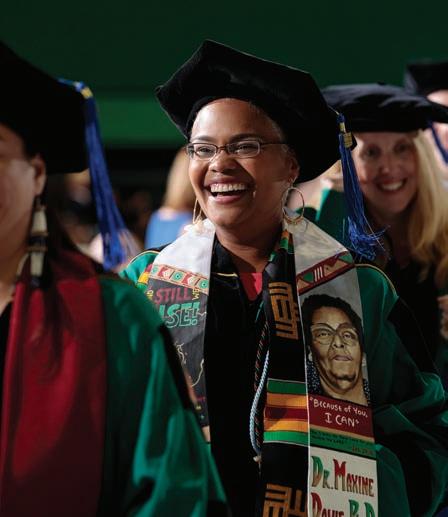
Other sources of financial support have included:
Brown School
National Institute of Mental Health
National Institute on Drug Abuse
Olin-Chancellor's Fellowship
McDonnell International Scholars Academy
John A. Hartford Foundation
Fulbright Scholar Program Council on Social Work Education Minority Fellows Program
Open Society Foundation Taiwan Ministry of Education
At the Brown School, doctoral students are immersed in a transdisciplinary environment that prepares them to become global scholars. Our worldrenowned faculty, dedicated staff and research centers work together to support hands-on learning. We invite you to join us.
A better and more equitable society.
To engage multidisciplinary faculty, staff and students to create a better and more equitable society through leading rigorous science, transformative education and authentic partnerships.
Immerse students in an evidence-based learning experience with faculty who are driving new solutions to contemporary social, health and structural challenges in society. Connect students with practitioners who are leading efforts to address the root causes and consequences of inequities. Create an environment for students to co-create knowledge by collaborating with faculty on research studies and bringing innovations into practice.
Generate rigorous, innovative and high-impact scholarship to build an evidence base vital to solving real-world problems. Guided by the highest ethical standards, forge and strengthen inclusive, authentic and multidisciplinary collaborations to move high-quality applied research into practice and policy.
Develop authentic community partnerships that are based on equity, transparency and mutually empowering relationships that are focused on achieving sustainable change in service of the public good.
Promote equity, racial and social justice through fair, inclusive, transparent, and sustainable practices and processes. Aspire to be catalysts for change and transformation, identifying barriers and co-creating solutions that will lead to greater justice.